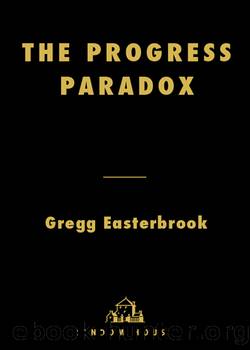The Progress Paradox by Gregg Easterbrook

Author:Gregg Easterbrook
Language: eng
Format: epub
ISBN: 9781588363268
Publisher: Random House Publishing Group
Published: 2003-11-24T16:00:00+00:00
A fundamental reason that acquiring money does not sync with acquiring happiness might be stated in cool economic terms: Most of what people really want in lifeâlove, friendship, respect, family, standing, funâis not priced and does not pass through the market. If something isnât priced you canât buy it, so possessing money may not help much.
True, many have used money in attempts to buy respect, love, or friendship, and you can certainly use money to buy sex. But the kind of sex you get for money isnât likely to be as good as the unpriced kindâand the same obtains for the kind of respect, love, or friendship you can buy with money. There are ways to make an economic purchase of fun: vacations, amusement parks, movies, sports events. But when it comes to fun, thereâs little relationship between price and value, as a simple inexpensive picnic might turn out to be a wonderful time while a cost-is-no-object resort stay might turn out unsatisfying. Even this intangible of life, which the market does attempt to price, doesnât relate to money in any way that reliably produces the desired result. Weâve all spent money on things that were supposed to be fun, and later wished we hadnât.
Surely most people would say that the most important commodity that lacks price and thus cannot be bought is love. The human need for love may not just be a matter of sentiment: In their groundbreaking 2000 book A General Theory of Love,10 three academic psychologists, Thomas Lewis, Fari Amini, and Richard Lannon, proposed that love is actually a physical necessity. âLove is simultaneous mutual regulation, where each person meets the needs of the other because neither can provide for his own,â the authors wrote.
In the clunky theoristâs phrase âsimultaneous mutual regulation,â the authors were referring to studies showing that the limbic portion of the brain, from which emotions arise and where dreaming takes place, only functions properly among those with love, family ties, or close friendships in their lives. People who lack for love or close friendship often develop limbic abnormalities; the limbic part of the brain doesnât keep watch over regulatory chemicals properly. The chance discovery, in the 1950s, that certain drugs intended to treat tuberculosis also palliate depression is considered evidence of this concept, because this demonstrates that the emotional self is at least partly biological in origin. At first glance, the fact that drugs improve mood can sound like depressing determinismââchemicals make us happy.â But if emotions are biologically seated within the brain, then they are real and central to human life, not just some weepy distraction, and they must have evolved, just as our physical forms evolved.
Enlightenment thinking revered abstract thought, which arises from the neocortex portion of the brain, over all other mental functions; Enlightenment theorists viewed emotional needs as handicaps people must rise above, and many in the West have embraced this view, perhaps to their detriment. A General Theory of Love counters with the contention that the human
Download
This site does not store any files on its server. We only index and link to content provided by other sites. Please contact the content providers to delete copyright contents if any and email us, we'll remove relevant links or contents immediately.
Time Management Made Easy: How to Cultivate New Habits, Improve Productivity and Get Things Done by Joshua Strachan(2417)
The 7 Habits of Highly Effective People by Stephen R. Covey & Sean Covey(2267)
The Concise Laws of Human Nature by Robert Greene(1913)
Doesn't Hurt to Ask by Trey Gowdy(1637)
Primal Leadership by Daniel Goleman(1283)
Hook Point: How to Stand Out in a 3-Second World by Brendan Kane(1245)
Don't Sweat the Small Stuff...and It's All Small Stuff by Richard Carlson(1121)
HBR's 10 Must Reads 2021 by unknow(1096)
The Power of 100! by Shaun King(1096)
Amazon Unbound by Brad Stone(1045)
100 Things Successful People Do by Nigel Cumberland(1029)
Master of One by Jordan Raynor(1008)
HBR's 10 Must Reads 2021 by Harvard Business Review(1007)
The Job Closer by Steve Dalton(993)
Lives of the Stoics by Ryan Holiday & Stephen Hanselman(969)
Declutter Your Mind: A step by step guide to learn to control your thoughts, stop worrying, relieve anxiety and eliminate panic attacks and negative thinking by Mia Chandler(968)
Conflicted by Ian Leslie(872)
The Book of Hope by Jane Goodall(872)
Coders at Work: Reflections on the craft of programming by Peter Seibel(847)
